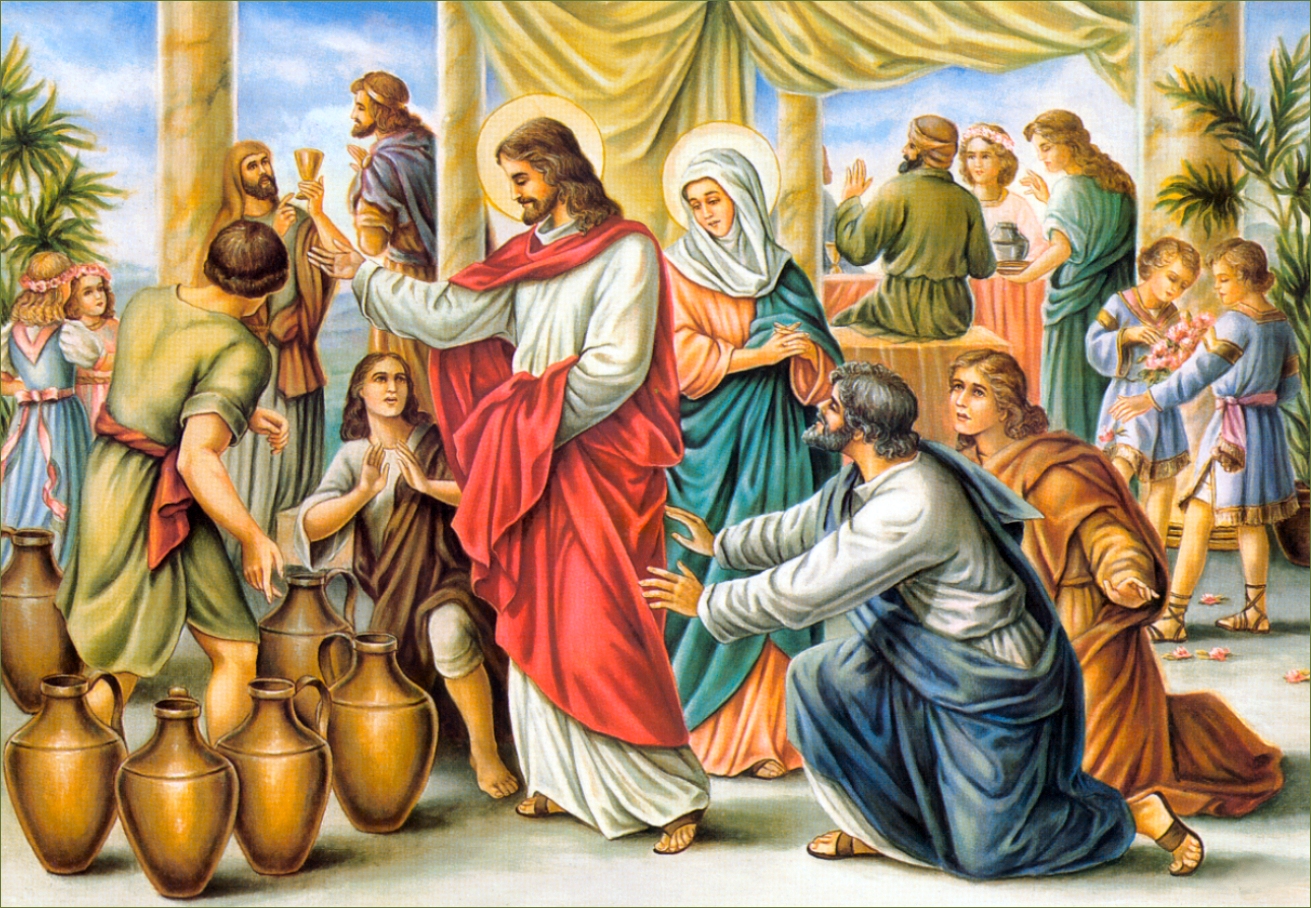1On the third day a wedding took place at Cana in Galilee. Jesus’ mother was there, 2and Jesus and his disciples had also been invited to the wedding. 3When the wine was gone, Jesus’ mother said to him, “They have no more wine.”The first thing that strikes me is the opening lines. A wedding took place. Jesus's mother was there. Why is Mary mentioned first? You would expect John to start by saying Jesus was there and then follow with Mary and the disciples were also there. He does not. He tells the story like Mary is the main character with Jesus and the disciples playing supporting roles. Still he does not mention her name. She is referred to as Jesus' mother and, by Jesus, as "woman." So the emphasis is not on her in isolation. Her relation to Jesus and the fact that she is a woman are in focus.
4“Woman,a why do you involve me?” Jesus replied. “My hour has not yet come.”5His mother said to the servants, “Do whatever he tells you.”
6Nearby stood six stone water jars, the kind used by the Jews for ceremonial washing, each holding from twenty to thirty gallons.b7Jesus said to the servants, “Fill the jars with water”; so they filled them to the brim.
8Then he told them, “Now draw some out and take it to the master of the banquet.”They did so, 9and the master of the banquet tasted the water that had been turned into wine. He did not realize where it had come from, though the servants who had drawn the water knew. Then he called the bridegroom aside 10and said, “Everyone brings out the choice wine first and then the cheaper wine after the guests have had too much to drink; but you have saved the best till now.”
11What Jesus did here in Cana of Galilee was the first of the signs through which he revealed his glory; and his disciples believed in him.
12After this he went down to Capernaum with his mother and brothers and his disciples. There they stayed for a few days.
Jean Vanier remarked about this passage that Jesus could have kicked off his ministry in a lot of ways. He could have gone to the temple. He could have focused on prayer or on scripture or a bunch of other things. Yet he starts by taking them to a party. A party where there a wedding being celebrated and wine being consumed. It is a joyful occasion. A celebration of love.
Yet the joy is not born out of a denial of sin. Where is the sin in the story? There are 6 20-30 gallon jars of water for ceremonial washing. What were they washing themselves from? Sin. Why so many large jars? This household seems to have frequently called to mind their sins and asked God to forgive them. It was they way they lived.
Still the theme of joy is here. Joy that is natural human joy. Yet human joy is finite. The wine runs out. Jesus provides an abundance of wine measured in the same jars that show their desire for holiness. Jesus provides a better sort of joy that becomes evident when the superficial joy runs out.
Yet Jesus does not just do this. He seems reluctant at first. Mary tells Him the problem. She does not ask him to do anything. His response seems strange. It actually parallels some of the things demons say to Jesus (Mt. 8:29; Mk 1:24 and 5:7; Luke 4:34 and 8:28). Sort of acknowledging an authority but suggesting that authority does not apply here. Like Jesus was saying I would normally do what you ask out of respect for you as my mother but not this. Mary accepts it but still does not give up. Really there is no other instance of Jesus seeming to say one thing and do another like this one. Like we are meant to see Jesus have his heart softened by his mother's intercession. Apart from her impact on Jesus we see her impact on the servants. She tells them to obey Jesus. Having Mary intercede is not an alternative to obeying Jesus. We have to do both.
Yet what about that word "woman?" Jesus refers to women that way a few times. It is not disrespectful. Yet nobody else in Greek literature refers to their mother that way. Jesus does so consistently. Why is that? As a protestant I was taught that meant Jesus thought of her as an ordinary woman and not as His mother. That would make Jesus less than human and in violation of the command to honour His mother. Maybe rather than making Mary less than His mother He is making her more than His mother. Maybe He is connecting her with all womanhood. Certainly that is where the early church fathers went. They connect this with Gen 3:15 and call Mary the New Eve.
Jesus is actually presented here as a bridegroom messiah. Some more liberal theologians have used this passage to suggest Jesus was married. The bride and groom are not mentioned here and the one time the bridegroom is addressed by the master of the banquet we are aware that he should be saying this about Jesus. Remember there is a lot of Old Testament talk about the Messiah as Israel's spiritual husband. John is drawing on this and Mary is standing in for the church which is the bride.

No comments:
Post a Comment